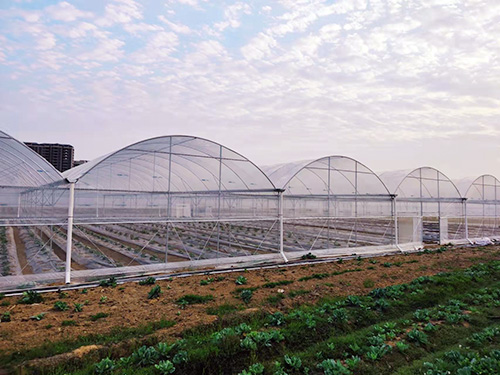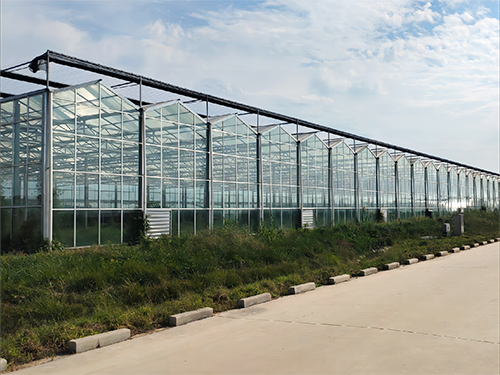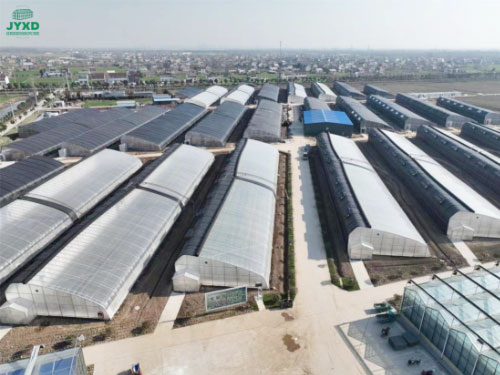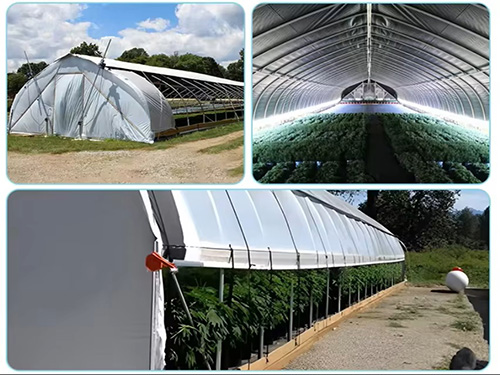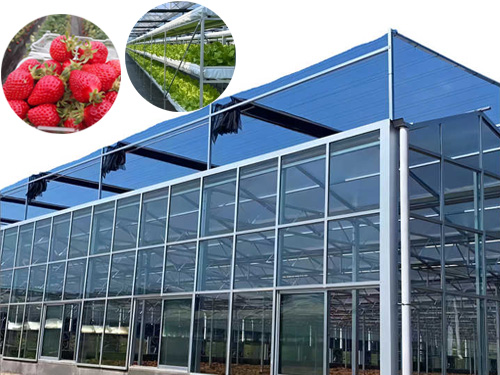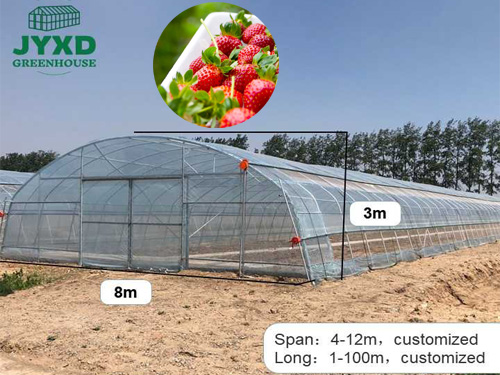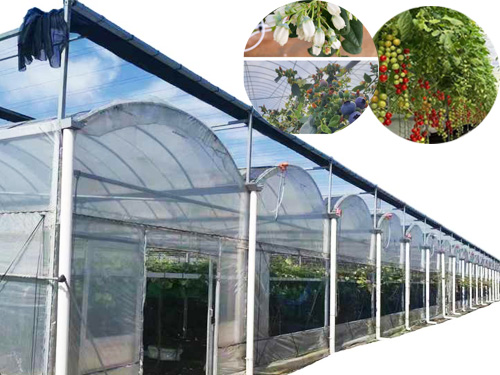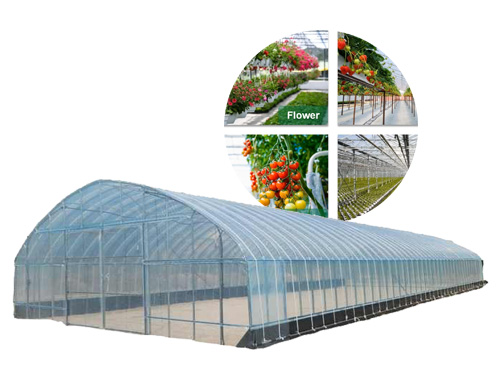NEWS DETAILS
NEWS INFORMATION
Urban Edge Greenhouse Farming: Land Use Strategies for Peri-Urban Food Security
AUTHOR:jyxd-greenhouse DATE:2025-04-07 17:32:23 HITS:171
As urban populations grow, the demand for fresh, locally grown food is increasing. Urban edge greenhouse farming, located in peri-urban areas—the transitional zones between urban and rural landscapes—offers a sustainable solution to enhance food security, reduce transportation costs, and promote local agriculture. This article explores land use strategies for peri-urban greenhouse farming and its role in ensuring food security for urban populations.
Why Urban Edge Greenhouse Farming Matters
Peri-urban greenhouse farming addresses several critical challenges:
· Food Security: Provides a reliable source of fresh produce for urban populations.
· Resource Efficiency: Reduces the need for long-distance transportation, lowering carbon emissions.
· Economic Opportunities: Creates jobs and supports local economies.
· Sustainability: Utilizes underused land and promotes eco-friendly farming practices.
1. Land Use Strategies for Peri-Urban Greenhouses
Maximizing the potential of peri-urban areas for greenhouse farming requires strategic land use planning. Here are key strategies to consider:
Identifying Suitable Land:
· Underutilized Spaces: Convert vacant lots, abandoned industrial sites, or degraded land into productive greenhouses.
· Zoning Regulations: Work with local governments to identify areas zoned for agricultural use or mixed-use development.
· Accessibility: Choose sites with easy access to urban markets, transportation networks, and utilities.
Efficient Space Utilization:
· Vertical Farming: Use vertical growing systems to maximize space in compact areas.
· Modular Greenhouses: Deploy modular or mobile greenhouses that can be easily expanded or relocated.
· Multi-Functional Spaces: Combine greenhouses with other uses like community gardens, farmers’ markets, or educational centers.
Sustainable Practices:
· Renewable Energy: Install solar panels or wind turbines to power greenhouse operations.
· Water Management: Implement rainwater harvesting and drip irrigation systems to conserve water.
· Soil Health: Use organic farming methods and soil amendments to maintain fertility.
2. Enhancing Food Security Through Peri-Urban Greenhouses
Greenhouse farming in peri-urban areas can significantly contribute to urban food security by:
Providing Fresh Produce:
· Year-Round Production: Greenhouses enable the cultivation of fresh vegetables and fruits year-round, regardless of external weather conditions.
· Local Supply: Reduce reliance on imported produce by supplying locally grown food to urban markets.
Reducing Food Miles:
· Shorter Supply Chains: Minimize the distance food travels from farm to table, ensuring fresher produce and lower transportation costs.
· Lower Carbon Footprint: Decrease greenhouse gas emissions associated with long-distance food transport.
Supporting Vulnerable Communities:
· Affordable Food: Offer fresh produce at lower prices by reducing transportation and storage costs.
· Community Engagement: Partner with local organizations to provide food to underserved communities.
3. Economic and Social Benefits of Peri-Urban Greenhouse Farming
Urban edge greenhouse farming offers numerous advantages for local economies and communities:
Job Creation:
· Employment Opportunities: Create jobs in construction, farming, distribution, and retail.
· Skill Development: Train local residents in greenhouse management and sustainable agriculture.
Economic Growth:
· Local Investment: Attract investment in infrastructure, technology, and community development.
· Market Expansion: Supply urban markets, restaurants, and grocery stores with fresh, locally grown produce.
Community Building:
· Educational Programs: Offer workshops and tours to educate urban residents about agriculture and sustainability.
· Social Cohesion: Foster connections between urban and rural communities through shared agricultural initiatives.
4. Case Studies: Successful Peri-Urban Greenhouse Farms
Gotham Greens in New York City:
· Model: Rooftop greenhouses producing leafy greens and herbs for local markets.
· Success: Supplies over 40 retailers and restaurants, reducing food miles and carbon emissions.
BrightFarms in Chicago:
· Model: Peri-urban greenhouses growing salad greens for supermarkets.
· Success: Provides fresh produce to over 1,000 stores, enhancing local food security.
UrbanFarmers in The Hague:
· Model: Greenhouses combined with aquaponics systems to grow fish and vegetables.
· Success: Supplies local schools and restaurants while promoting sustainable agriculture.
5. Best Practices for Peri-Urban Greenhouse Farming
To maximize the success of your peri-urban greenhouse farm, follow these best practices:
Collaborate with Stakeholders:
· Local Governments: Work with municipalities to secure land and navigate zoning regulations.
· Community Organizations: Partner with NGOs and schools to promote food security and education.
· Private Sector: Collaborate with businesses for funding, technology, and market access.
Invest in Technology:
· Automation: Use automated systems for climate control, irrigation, and monitoring.
· Data Analytics: Leverage data to optimize crop yields and resource use.
Promote Sustainability:
· Eco-Friendly Practices: Implement renewable energy, water conservation, and organic farming methods.
· Waste Management: Compost organic waste and recycle materials to minimize environmental impact.
6. Benefits of Urban Edge Greenhouse Farming
Implementing peri-urban greenhouse farming offers numerous advantages:
· Improved Food Security: Ensures a steady supply of fresh produce for urban populations.
· Economic Resilience: Creates jobs and supports local economies.
· Environmental Sustainability: Reduces carbon emissions and promotes eco-friendly practices.
· Community Well-Being: Enhances access to fresh food and fosters social connections.
Conclusion
Urban edge greenhouse farming is a powerful strategy for enhancing food security, promoting sustainability, and supporting local economies in peri-urban areas. By adopting strategic land use practices and leveraging greenhouse technology, growers can provide fresh, locally grown produce to urban populations while reducing environmental impact. Whether you’re a small-scale farmer or a commercial operator, peri-urban greenhouse farming offers a unique opportunity to address the challenges of urbanization and contribute to a more sustainable future.
For more expert tips and high-quality greenhouse solutions, visit our website and take your farming practices to the next level. Let’s grow smarter and cultivate a greener future together!
![]()
Meta Description: Discover how urban edge greenhouse farming enhances food security in peri-urban areas. Learn land use strategies and benefits for sustainable local agriculture.
Hebei Juyou Xinda Greenhouse Facilities Co.,Ltd.
Copyright © 2024-2025 https://www.jyxd-greenhouse.com. All Rights Reserved Hebei Juyou Xinda Greenhouse Facilities Co.,Ltd.Copyright




 Current Location:
Current Location: